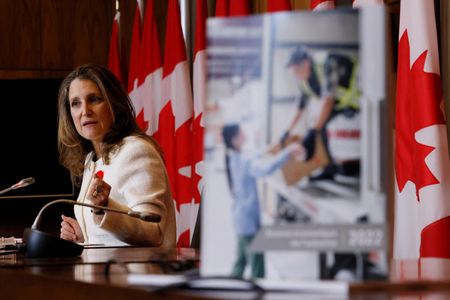TORONTO (Reuters) – Canadian Finance Minister Chrystia Freeland on Thursday unveiled an economic update, slashing 2023 real GDP forecast to 0.7%, but said the economy would avoid a recession, while announcing C$11.3 billion ($8.2 billion) in new spending this fiscal year and next.
The so-called Fall Economic Statement also proposes a refundable tax credits for clean technologies, a 2% tax on share buybacks, among others.
STORIES:
LINK:https://budget.gc.ca/fes-eea/2022/report-rapport/FES-EEA-2022-en.pdf
COMMENTS
RANDALL BARTLETT, SENIOR DIRECTOR OF CANADIAN ECONOMICS AT DESJARDINS
“As expected – big windfall to revenues coming from higher inflation and a stronger economy, tighter labour market.”
“On the spending side, there were some new measures put in. They felt like they were trying to keep up with our neighbors to the south a little bit in order to match some of the measures in the Inflation Reduction Act.”
“Outside of that and the additional affordability measures they did keep some of the revenue windfall powder dry in order to contend with a likely meaningful economic downturn next year.”
“They’ve kept some cash in the kitty in order to contend with that sort of downturn.”
REBEKAH YOUNG, VICE PRESIDENT AT SCOTIABANK
“My take on the update is that in isolation it is relatively well contained … the incremental stuff that markets will look at, the affordability measures, are really pretty small.”
“In isolation it is nothing to set off alarms about – inflation pressures that are going to change our outlook on growth or inflation or interest rates – but you can’t look at it in isolation. We know that once you add in provinces we’re up closer to C$23 billion (in affordability measures).”
“Overall, it’s not really restraint which is the message that the minister would like out there. They do continue to spend modest amounts and strong revenues have allowed that.”
ROBERT KAVCIC, SENIOR ECONOMIST AT BMO CAPITAL MARKETS
“It’s pretty close to what we would have expected. The deficit this year, obviously quite a bit smaller, we expected that because we knew last year came in better and we knew that the economy performed better and revenues were going to be strong.”
“The next couple of years also pretty much what we would have expected because the economic outlook we have is quite a bit weaker than what was in the budget so there’s not a big reduction in the deficit over the next couple of years and we didn’t really expect that either.”
“One thing we were watching was just how much new spending there was going to be and it looks like about C$5 to C6 billion per year of new spending. In the context of how much revenue strength there is, it’s not too much but I guess the reality is that Ottawa is still incrementally adding to the economy at a time that the Bank of Canada is fighting inflation. “
“But I think the dollar amounts are small enough here that it’s not going to have a major impact … so I don’t think it’s going to move the needle too much.”
(Reporting by Fergal Smith, Ismail Shakil; Editing by Denny Thomas)

